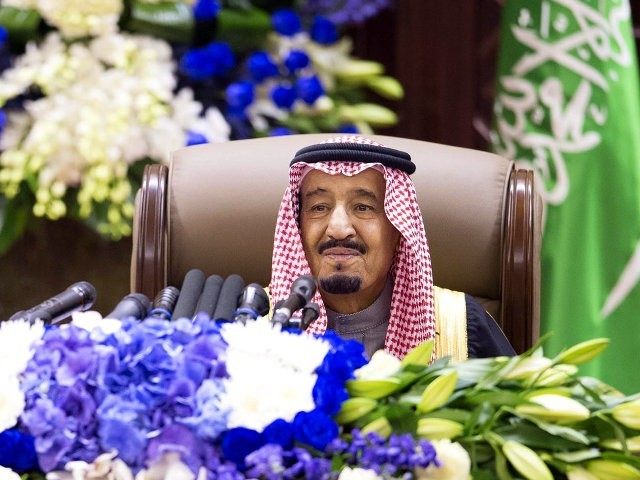The Wall Street Journal ran an editorial on Sunday afternoon titled, “Who Lost the Saudis?” It lays out a convincing case for why Russia and Iran are out to get the House of Saud—which, for all of its many, many flaws, is still an impediment to the agenda of America’s primary geopolitical adversaries.
There is plenty of bad blood between Saudi Arabia and Iran, the champions of the warring Sunni and Shiite branches of Islam, but there is also a simple dollars-and-cents reason Iran and Russia want to take out the Saudi monarchy: oil.
Iran already has ample reason to want to topple the Saudis, who are its main antagonist in the Shiite vs. Sunni conflict that has swept the region amid America’s retreat. The two are fighting a proxy war in Yemen, after a Saudi-led coalition intervened to stop a takeover by Iran’s Houthi allies. The Saudis are also the leading supporter of the non-Islamic State Sunnis who are fighting Syria’s ally Bashar Assad. Russia and Iran are allied with Assad.
Then there’s Saudi oil production keeping oil prices low. As the biggest exporters in OPEC, the Saudis have refused to cut production to stem a supply glut that has cut prices to $37 a barrel. This means Iran will get much less benefit from its renewed ability to export oil under its nuclear accord with Mr. Obama.
Saudi exports are also punishing Russia, the world’s second largest oil producer, which by some accounts needs oil at $100 a barrel to satisfy Vladimir Putin’s domestic promises. The ruble dropped to its lowest level to the dollar in 2015 last week on the prospect of still-lower oil prices. Russia and Iran would benefit greatly from internal Saudi turmoil or the threat of a larger regional war that caused oil prices to spike.
The Iranians are emboldened by President Obama’s nuclear deal and his obvious reluctance to take any action that would severely displease Tehran. The Journal suggests many of Iran’s recent actions, such as launching rockets near the aircraft carrier USS Harry S. Truman, might have been tests of the administration’s tolerance to Iranian provocation. The White House delay of sanctions against Iran for its illegal ballistic-missile tests were another provocative demonstration of weakness.
“Iran’s leaders may believe the nuclear deal is a greater restraint on the U.S. than on their own regional ambitions,” ventured the Wall Street Journal’s editors.
Meanwhile, the chances of the Saudi-Iran conflict escalating are increased by Saudi apprehension that Obama does not have their back. The WSJ notes that the Saudis have been keeping the U.S. out of the loop for some important policy decisions, such as their 2011 intervention in Bahrain and their decision to lead a bombing campaign against the Iran-backed Houthi rebels in Yemen.
One of the principal complaints leveled by Saudi Arabia and other Gulf states against Iran is that the Iranians are constantly working to foment unrest among Shiite populations in Sunni-dominated governments, up to and including the shipment of arms to facilitate insurgencies. The Shiite cleric executed this weekend, Nimr al-Nimr, was a violent revolutionary who considered the Sunni Gulf monarchies illegitimate. If his execution was the spark that lit off a powder keg in the Middle East, it should be noted that Iran worked long and hard to pile up the powder.
The Wall Street Journal called on the Obama administration to “make clear to Iran and Russia that it will defend the Kingdom from Iranian attempts to destabilize or invade.”
The problem at this point is that neither Vladimir Putin, nor the mullahs of Iran, have any reason to take such a warning seriously. On the contrary, Iran has ample reason to believe President Obama will indulge a great deal of adventurism.
The current crisis does not have to end with a military confrontation to suit Iran’s agenda. Iran and its allies have been working hard to marginalize the Saudis after their weekend mass execution, with much discussion of securing a United Nations denunciation.
In April, the Washington Post quoted a top Iranian commander, Major General Mohammad Ali Jafari of the Revolutionary Guards Corps, musing that the Saudi monarchy was “teetering on the edge of collapse” after its intervention in Yemen. A growing number of Iranian officials have been predicting doom for the House of Saud, as have some outside analysts.
The silver linings for the Saudis mentioned in that April Washington Post article included the Saudis’ control of the oil weapon, and worsening fortunes for the Iran-supported Assad regime in Syria. Eight months later, Assad is looking pretty good, while ascendant Iran and Russia would love to break that Saudi grip on oil prices. They may see the current crisis as an opportunity to make their move.

COMMENTS
Please let us know if you're having issues with commenting.